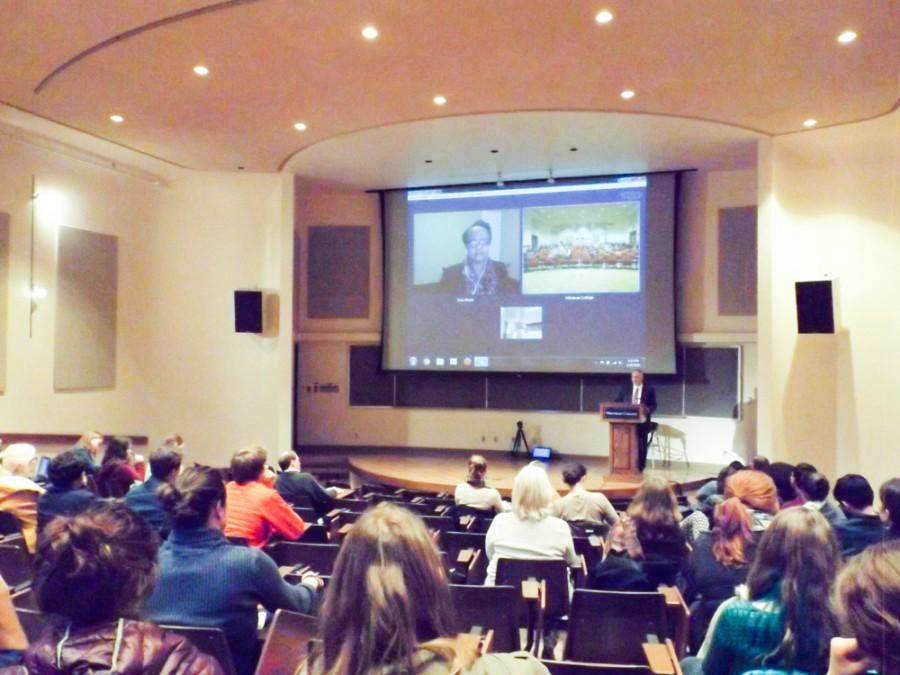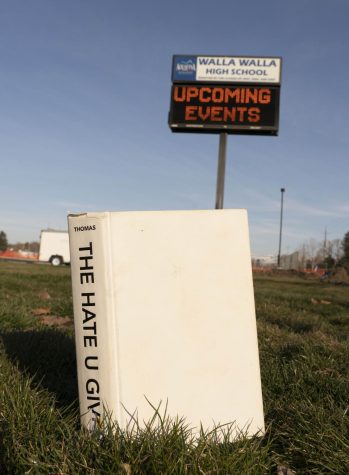Visiting Educator Concannon Discusses Human Rights Advocacy
February 4, 2016
Brian Concannon, a human rights lawyer currently working on human rights issues in Haiti and the Dominican Republic, visited Whitman as an O’Donnell Visiting Educator last week to host an interdisciplinary class and various other sessions on human rights advocacy and immigration issues.
The interdisciplinary course, titled “Human Rights Advocacy: How and Why,” explored techniques for human rights advocacy through the example of the 2010 Haitian cholera epidemic. Students discussed privilege, how foreign aid affects developing countries and how to write campaigns that appeal to Congress. Concannon is currently working on a legal campaign that would require the United Nations to take legal responsibility for the epidemic.
“One of the parts of the class was talking about [Concannon’s] case against the UN and about cholera in Haiti, and also on a larger level talking about the role of foreign aid and NGOs and how a lot of the work that the American Government has done in Haiti has been really poor and ineffective,” said sophomore Aly Counsell, who took the class.
After working for a corporate law firm, Concannon decided to go into human rights work, and ended up in Haiti working for the United Nations. After nine months there, he decided to move to working with nonprofits. Now, Concannon’s organization, Institute for Justice and Democracy in Haiti, does advocacy, press work and provides legal counsel to Haitians. Recently, Concannon has been working on immigration issues occurring between Haiti and the Dominican Republic.
Currently in the Dominican Republic, which shares an island in the Caribbean with Haiti, thousands of ethnic Haitians are being deported because of a new law that requires people to show proof of citizenship. As a result of the new law, tensions are rising between the two countries, and many questions remain about what to do with all of the deported immigrants.

Concannon was brought to Whitman through the efforts of Assistant Professor of Politics Jack Jackson, Associate Professor of Philosophy Professor Patrick Frierson and Associate Dean for Student Engagement Noah Leavitt, who are the three pre-law advisors for Whitman, along with Associate Professor of Foreign Languages Nicole Simek and Matthew Woodfork, who have done work related to the areas that overlap with Haiti.
Concannon’s work greatly overlaps with the subject of the Whitman Summer reading last year, Edwidge Danticat’s “Brother, I’m Dying.” Whitman hoped that by bringing Concannon in to discuss modern events in Haiti, students could have more experiences with the summer reading. Concannon and Danticat have worked together in the past, and one of the separate events that the Student Engagement Center hosted with Concannon was a Skype conversation between him and Danticat.
“Brian Concannon is somebody who is really the foremost lawyer in the United States who understands and works on cases that are about empowering Haitian citizens to have the most control over their country as possible, and … Brian is just somebody who is out there as a resource to understand Haiti from the standpoint of what the O’Donnell Global Studies Initiative really wants, which is for students to meet practitioners who are out in the world,” said Leavitt.
Concannon’s course involved discussions about the role of individuals in conflict-ridden places, how to use privilege to one’s advantage instead of creating risk, and whether or not one can really make a difference in marginalized places. These discussions all centered on methods to use one’s position to advocate for others and make social change.
“My advice is to get involved. These are things that I didn’t do, and that was a mistake I made. As soon as you can, start doing internships, externships, volunteer work, whatever you can do to get practical experience to complement the academic experience you get. I also think that people should, in terms of their education, it’s really important that during college that people develop their writing skills. It’s very hard to write well, and when you’re writing about things that are important, you need to do well every time, and college is a great time to practice that,” said Concannon.










J. Rhadamés Cabrera Balcácer • Feb 12, 2016 at 8:27 am
Failed event. Internet transmision was zero.
The Dominican Rep has a right to defend herself but this Whitman College did not had the elemental courtesy to invite.
It was a one sided event, very typical under some dictartorships regimens, left or right.
Sara Platnick, I hope you can read this and follow up my request.
Stop the lies and slander !
See the facts that former haitian ambassador to the DR said:
http://www.diariolibre.com/noticias/politica/supplice-confirma-su-destitucion-como-embajador-de-haiti-AJ597130
http://elnacional.com.do/embajador-haitiano-haiti-es-responsable-de-lo-que-le-pasa-a-sus-nacionales/
http://acento.com.do/2015/actualidad/8269611-impactantes-revelaciones-sobre-rd-y-haiti-en-carta-de-supplice-a-martelly/